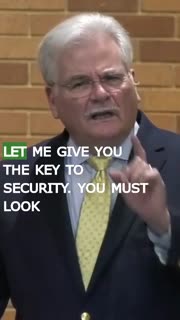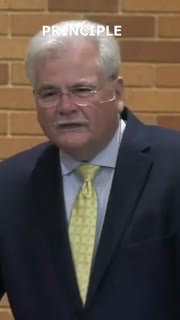Embracing Freedom and Pragmatism in Christ
Devotional
Sermon Summary
Bible Study Guide
Sermon Clips
### Quotes for Outreach
1. "If you have Jesus, you have everything you need. If you don't have Jesus, no matter what you have, you have nothing. That's the essence of Colossians 2." [06:09] (11 seconds)
2. "You don't have to be afraid of the principalities and powers. You don't have to obey the principalities and powers because they've been defeated by the Lord Jesus Christ. And when Jesus nailed all of the curses, all of the curses, all of the curses of the Old Testament to his cross, he set you free from the curse. The curse of the law. You're no longer under a curse. You're under a blessing." [17:13] (25 seconds)
3. "The Lord Jesus Christ, my Savior, your Savior, the eternal Son of the eternal God, truly God and truly human in one person, he is the substance of everything in the Old Testament and the New." [23:51] (14 seconds)
4. "If you're watching today on the internet I have a word for you and that is the Lord Jesus Christ. He's everything you need. Everything you need. If you have the Lord Jesus Christ you have it all. If you don't have Jesus you've got nothing at all." [35:23] (16 seconds)
5. "Let me give you the key to security. You must look for the Lord Jesus Christ this morning. Ask him to come into your heart. Ask him to take over and trust that when he died on the cross he died in your place and his blood cleanses you from all sin." [35:51] (16 seconds)
### Quotes for Members
1. "Pragmatism means doing that which works. Now, in many places, pragmatism is a bad term. But I submit to you, and we'll see further today why that's so, pragmatism is a good term. Why do things that don't work?" [02:31] (17 seconds)
2. "Our doctrine in terms of theological doctrine, our doctrine in terms of moral doctrine, that does not change. It never changes. But how we reach people with the gospel, should change as we encounter different cultures and different kinds of people. We should be flexible." [05:08] (20 seconds)
3. "Christ took, where you go to Matthew on this side and Malachi here back to Genesis, he took this and he nailed it to the cross. And let me tell you what that means. That doesn't mean that the Old Testament ended. It means that every single thing in the Old Testament passed through the matrix. What is a matrix? Not talking about the matrix. We're talking about the movie. Matrix is the womb. It passed through the womb of the death, burial, and resurrection of Christ." [13:17] (32 seconds)
4. "The regulative principle is so important because it regulates what the church can tell you to do. It regulates the ideas the church would put on you and say you need to do this, you need to do that, you need to do the other. The regulative principle is really the charter of liberty for every single Christian. And it's a charter of restraint on every leader of every church everywhere throughout all ages." [34:52] (28 seconds)
5. "You need to say when I tell you, you know, Bob, you don't need to do that. Or Becky, you don't need to do that. Or Kendall, you don't need to, Nathan, you don't need to do this. You need to say, hey preacher, show me that in the Bible. Where do you get that in the Bible? That's what you need to do." [29:33] (18 seconds)
Ask a question about this sermon
1. "If you have Jesus, you have everything you need. If you don't have Jesus, no matter what you have, you have nothing. That's the essence of Colossians 2." [06:09] (11 seconds)
2. "You don't have to be afraid of the principalities and powers. You don't have to obey the principalities and powers because they've been defeated by the Lord Jesus Christ. And when Jesus nailed all of the curses, all of the curses, all of the curses of the Old Testament to his cross, he set you free from the curse. The curse of the law. You're no longer under a curse. You're under a blessing." [17:13] (25 seconds)
3. "The Lord Jesus Christ, my Savior, your Savior, the eternal Son of the eternal God, truly God and truly human in one person, he is the substance of everything in the Old Testament and the New." [23:51] (14 seconds)
4. "If you're watching today on the internet I have a word for you and that is the Lord Jesus Christ. He's everything you need. Everything you need. If you have the Lord Jesus Christ you have it all. If you don't have Jesus you've got nothing at all." [35:23] (16 seconds)
5. "Let me give you the key to security. You must look for the Lord Jesus Christ this morning. Ask him to come into your heart. Ask him to take over and trust that when he died on the cross he died in your place and his blood cleanses you from all sin." [35:51] (16 seconds)
### Quotes for Members
1. "Pragmatism means doing that which works. Now, in many places, pragmatism is a bad term. But I submit to you, and we'll see further today why that's so, pragmatism is a good term. Why do things that don't work?" [02:31] (17 seconds)
2. "Our doctrine in terms of theological doctrine, our doctrine in terms of moral doctrine, that does not change. It never changes. But how we reach people with the gospel, should change as we encounter different cultures and different kinds of people. We should be flexible." [05:08] (20 seconds)
3. "Christ took, where you go to Matthew on this side and Malachi here back to Genesis, he took this and he nailed it to the cross. And let me tell you what that means. That doesn't mean that the Old Testament ended. It means that every single thing in the Old Testament passed through the matrix. What is a matrix? Not talking about the matrix. We're talking about the movie. Matrix is the womb. It passed through the womb of the death, burial, and resurrection of Christ." [13:17] (32 seconds)
4. "The regulative principle is so important because it regulates what the church can tell you to do. It regulates the ideas the church would put on you and say you need to do this, you need to do that, you need to do the other. The regulative principle is really the charter of liberty for every single Christian. And it's a charter of restraint on every leader of every church everywhere throughout all ages." [34:52] (28 seconds)
5. "You need to say when I tell you, you know, Bob, you don't need to do that. Or Becky, you don't need to do that. Or Kendall, you don't need to, Nathan, you don't need to do this. You need to say, hey preacher, show me that in the Bible. Where do you get that in the Bible? That's what you need to do." [29:33] (18 seconds)










